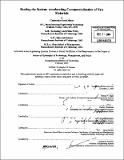Beating the system : accelerating commercialization of new materials
Author(s)
Musso, Christopher Scott, 1974-
DownloadFull printable version (19.68Mb)
Other Contributors
Massachusetts Institute of Technology. Technology, Management, and Policy Program.
Advisor
Thomas W. Eagar.
Terms of use
Metadata
Show full item recordAbstract
Over the past century, materials have faced notoriously long delays between invention and commercialization. These delays make private investment very difficult, and can prevent good materials from reaching markets. A systematic exploration of the commercial histories of major commodity thermoplastics was performed, which showed that these delays were attributable to technical deficiencies in materials and obstacles in the application value chains. Contrary to popular wisdom, material costs, competitive materials, and serendipity were much smaller factors in commercialization delay. The factors that led to insertion of plastics into applications were different from the factors that led to post-insertion growth. The major plastics showed a characteristic pattern of commercialization. First, they entered simple, small applications in which they solved new problems. They then progressed to achieve insertion in a single major application, which they continue to dominate today. Having established themselves with this application, they found insertion in a wide range of large applications. The commercialization pattern can be explained in large part by the concept of switching costs. As knowledge of a material increases, switching costs are reduced; as value chain complexity increases, switching costs increase. The earliest applications required little understanding of plastics and had simple value chains, so switching costs were low, corresponding to fast commercialization. Later applications had more complex value chains and required much more detailed understanding of the failure modes and processing parameters of the material, corresponding to high switching costs and slow commercialization. Materials can be deployed into (cont.) many markets. By strategically selecting application markets, materials producers can significantly improve the probability that new materials will be adopted and can shorten the period of commercialization. Early markets should be selected based on the ability of the material to solve unique problems and the simplicity of the application value chain. When market selection is not an option, materials producers can integrate forward in the value chain to shorten commercialization times, but capital requirements are very high. Once integrated into an application, the safest competitive position for materials is to be the lowest cost option that meets the exact needs of the application.
Description
Thesis (Ph. D.)--Massachusetts Institute of Technology, Engineering Systems Division, Technology, Management, and Policy Program, February 2005. Includes bibliographical references (p. 233-249).
Date issued
2005Department
Massachusetts Institute of Technology. Engineering Systems Division; Technology and Policy ProgramPublisher
Massachusetts Institute of Technology
Keywords
Technology, Management, and Policy Program.